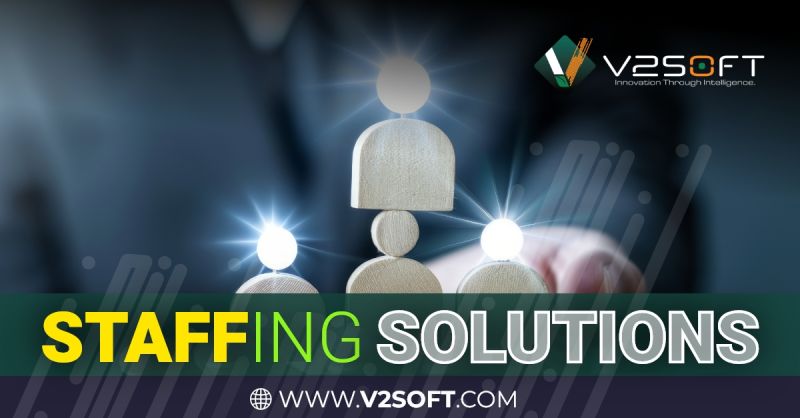Tech Staffing Solutions: How AI and Global Management Are Revolutionizing Recruitment
In the rapidly evolving world of technology, businesses are constantly seeking effective ways to find and retain skilled personnel. With the growing demand for tech talent, tech staffing solutions have become essential. In this blog, we will explore how integrating AI in staffing services, along with effective workforce management strategies, can help organizations address recruitment challenges and optimize their staffing processes.
Understanding Tech Staffing Solutions
Tech staffing solutions encompass various strategies that organizations employ to recruit, hire, and manage technical talent. These solutions can include permanent placements, contract staffing, and contingent workforce management.
What Are the Key Types of Tech Staffing Solutions?
- Permanent Staffing Solutions: These involve hiring employees on a full-time basis. Companies invest in permanent staffing when they anticipate long-term needs for specific skills.
- Contract Staffing Solutions: Organizations hire employees for a specified period or project. This flexibility allows companies to meet short-term demands without the commitment of permanent employment.
- Contingent Workforce Management: This approach involves managing temporary or freelance workers. It enables businesses to scale their workforce according to fluctuating project requirements.
The Role of AI in Staffing Solutions
Artificial Intelligence (AI) is revolutionizing the way companies approach recruitment. By leveraging AI in staffing services, organizations can streamline their hiring processes and improve the quality of their hires.
Benefits of AI in Staffing
1. Enhanced Candidate Sourcing
AI algorithms can analyze vast amounts of data to identify potential candidates quickly. They can scan resumes, online profiles, and even social media activity to match candidates with job openings. This increases efficiency and reduces the time spent on manual searches.
2. Automated Screening and Assessment
One of the biggest challenges in recruitment is sorting through applications. AI can automate the initial screening process, filtering out unqualified candidates based on predetermined criteria. This allows recruiters to focus on interviewing and engaging with the most suitable candidates.
3. Improved Candidate Experience
AI-driven chatbots can enhance the candidate experience by providing immediate responses to inquiries. They can answer questions about the application process, provide feedback, and schedule interviews, ensuring candidates feel valued and informed throughout the process.
4. Data-Driven Insights
AI tools can analyze recruitment metrics and trends, offering insights that help organizations refine their strategies. By evaluating which sources yield the best candidates or identifying bottlenecks in the hiring process, companies can make data-driven decisions.
Addressing the Shortage of Staff
Despite the advantages of AI and innovative staffing solutions, many organizations face a shortage of staff with the required technical skills. This recruitment shortage poses significant challenges, particularly in competitive fields such as software development, data analytics, and cybersecurity.
Strategies to Mitigate Staffing Shortages
- Upskilling Existing Employees: Organizations can invest in training programs to help current employees develop new skills. This approach not only addresses skill gaps but also enhances employee retention.
- Leveraging Global Talent Pools: By expanding recruitment efforts internationally, organizations can access a broader range of candidates. Global workforce management solutions enable businesses to hire talent from diverse locations, enhancing team diversity and innovation.
- Flexible Work Arrangements: Offering remote work options can attract candidates who prefer flexibility. This approach widens the talent pool and accommodates individuals who may not be willing or able to relocate.
Global Workforce Management Solutions
In an increasingly interconnected world, global workforce management has become essential for organizations looking to enhance their staffing capabilities. By utilizing global solutions, companies can overcome local talent shortages and access specialized skills.
Advantages of Global Workforce Management
- Access to Diverse Talent Pools: Hiring talent from different geographical locations allows companies to leverage unique skills and perspectives. A diverse workforce can foster creativity and innovation, contributing to better problem-solving and project outcomes.
- Cost Efficiency: Global staffing solutions often enable companies to find qualified candidates in regions with lower labor costs. This can lead to significant savings without compromising the quality of work.
- 24/7 Productivity: Hiring across various time zones facilitates continuous operations. This is particularly valuable for tech firms that require constant support and innovation.
- Compliance with Local Regulations: Global workforce management ensures that companies adhere to labor laws and regulations in different regions. This minimizes legal risks and fosters a more sustainable business model.
Managed Capacity in Staffing Solutions
Managed capacity refers to the practice of adjusting staffing levels according to project demands. This flexible approach helps organizations meet their needs without overcommitting resources.
Benefits of Managed Capacity
- Cost Control: By employing temporary staff only when needed, organizations can better manage their budget. This reduces overhead costs and increases financial flexibility.
- Access to Specialized Talent: Managed capacity allows organizations to bring in specialists for specific projects without the long-term commitment of permanent employment. This is particularly beneficial for short-term or specialized projects.
- Improved Project Outcomes: By utilizing managed capacity, organizations can enhance the quality of their projects. Having the right talent at the right time leads to more successful outcomes.
Challenges in Tech Staffing Solutions
While tech staffing solutions offer numerous benefits, organizations also face several challenges:
- Recruitment Shortages: The ongoing staffing shortages across various industries make it challenging for companies to find qualified candidates. This can lead to delays in project timelines and reduced productivity.
- Rapidly Changing Technology: The pace of technological change requires ongoing training and development. Organizations must be proactive in adapting their staffing strategies to meet these evolving demands.
- Cultural Fit and Team Dynamics: When hiring from diverse backgrounds, ensuring a cohesive team dynamic is vital. Organizations must focus on fostering inclusivity and collaboration to maximize the benefits of diverse perspectives.
Conclusion
Tech staffing solutions play a crucial role in helping organizations navigate the complexities of recruiting and retaining talent. By leveraging AI, managed capacity, and global workforce management solutions, businesses can address recruitment challenges and optimize their staffing processes. As the demand for technical talent continues to grow, embracing innovative staffing approaches will be essential for achieving success in today’s competitive landscape.














Post Comment